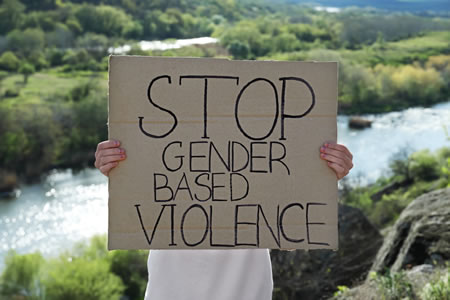
Ma Hkawn was married for 20 years. She lived with eight family members including her five children, their grandmother as well as her sister-in-law and her husband in the same compound. Brang Zet, her husband, was the breadwinner, and Ma Hkawn stayed at home and took care of her sick mother-in- law and their For the Sake of Her Children Women Empowerment Base five children. She could not earn any income herself. Her husband drank a lot and regularly got very angry with his wife and children. Sometimes, when he got drunk, he threatened Ma Hkawn.
 On one occasion, when he was not satisfied with the meal she had prepared Brang Zet told her, “This food is tasteless... it is like food for a pig.” Ma Hkawn replied, “I have to take care of my mother-in-law and our children. But I did what I could to prepare the food nicely.” Her husband told her to be quiet and slapped her cheek. Ma Hkawn warned him, “You have no right to hurt me.” But knowing she was financially dependent on him, he told her, “You are my wife, and I can kill you if I want.” He then took a small axe and tried to hit her. Luckily, she moved quickly and managed to avoid his attack.
On one occasion, when he was not satisfied with the meal she had prepared Brang Zet told her, “This food is tasteless... it is like food for a pig.” Ma Hkawn replied, “I have to take care of my mother-in-law and our children. But I did what I could to prepare the food nicely.” Her husband told her to be quiet and slapped her cheek. Ma Hkawn warned him, “You have no right to hurt me.” But knowing she was financially dependent on him, he told her, “You are my wife, and I can kill you if I want.” He then took a small axe and tried to hit her. Luckily, she moved quickly and managed to avoid his attack.
But then he came after Ma Hkawn with a knife. Three of the children clung to their mother and the other two children clung to their father’s leg and cried out, “Daddy, don’t do that to mummy. If you want to beat mummy, hit us first.” It was only then, the father set the axe aside. But he was still very angry and continued to verbally threaten his wife. The children sent their mother temporarily to a neighbor’s house.
Sadly, Ma Hkawn suffered violence not only at the hands of her husband, but she also suffered sexual and verbal abuse from the husband of her sister-in-law, who was staying in the same compound. Ma Hkawn’s husband passed away at an early age. Her inheritance had been made clear before he died, but after Brang Zet’s death, Ma Hkawn’s mother-in-law no longer wanted to give her the inheritance and tried to get rid of her by negotiating a marriage for her with another man. Because of her love for her children, Ma Hkawn opposed her mother-in-law’s wishes and refused to marry again. For the sake of her children, she patiently continues to live “at risk” of further abuse from her mother-in-law and the husband of her sister-in-law.
Decisive factors in many instances of gender-based violence are women’s low level of education, their lack of a regular income, and the low level of awareness around community development.
In 2020 as a response to the situation of women like Ma Hkawn I worked with three colleagues to set up a space called Women Empowerment Base (WEB), which seeks to promote gender equality and human dignity within families. Each year since then, we target different urban villages where we promote the protection of women from all forms of gender-based violence (GBV), as well as preparing a community-based resilience group on gender-based violence in communities.
We try to enable and empower women in the following ways: by facilitating growth in self-awareness through counselling, psychological/ legal care and medical treatment for survivors and those at risk; to choose and make decisions for their own families and also in other social contexts; and to have a regular income by using their skills in projects that generate money.
We realized that very few women in some areas of our state could make decisions on the development of their lives, their families and their communities. Decisive factors in many instances of gender-based violence are women’s low level of education, their lack of a regular income, and the low level of awareness around community development. Many cases of domestic abuse continue to occur because of reluctance on the part of parents or other significant persons in the family to report it. Some cultural and traditional practices result in silence which enables abusers while it leaves the victims to suffer.
In 2020 as a response to the situation of women like Ma Hkawn I worked with three colleagues to set up a space called Women Empowerment Base (WEB), which seeks to promote gender equality and human dignity within families.
Despite many obstacles, we support victims of gender-based violence through awareness sessions in their local communities. We refer victims for medical, legal, emotional treatment and to the security of a safe house. These sessions have made us aware of how the risk of gender-based violence is greatly intensified at times of a pandemic such as Covid-19 and in times of war.
We promote a message which helps people to understand that our services are life-saving interventions and different to the traditional “silent way.” We have supported and accompanied many victims toward inner healing and growth in self-esteem and self-confidence. Now, more of them have a voice, good inner strength and are growing in awareness of their rights as a human person. They are now on the road to discovering their own dignity as women and they know they have a support group with a safe place to which they can go in time of need.
We are grateful to all our benefactors and friends who enable us to provide this space and assistance to victims of this violence and to help them grow in freedom and hope towards a life in abundance despite all the restrictions and challenges they face.
Editor’s Note: Due to the difficult nature of the work with victims of abuse, the author of this article remains anonymous, and no photos of program participants are provided.